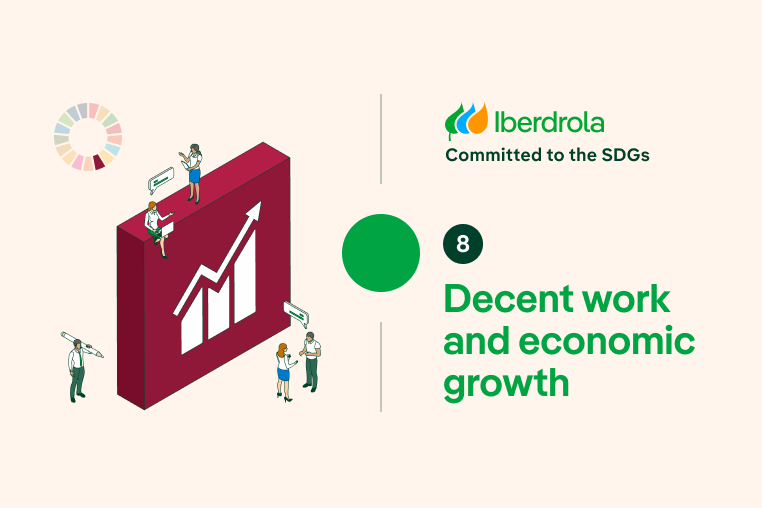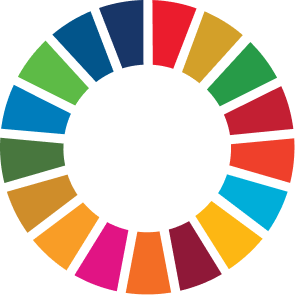SDG 8: Decent work and Economic growth
We act as a motor for economic and social development by creating stable and quality employment
At Iberdrola, we made 6,000 new hires in 2024, thus exceeding 42,200 total employees. In addition, the Group supports another 500,000 jobs at thousands of suppliers around the world through our purchases, which exceeded €18 billion in the year.
Goal 8: Decent work and economic growth. Video voice transcription (Spanish version) [PDF] External link, opens in new window.
SDG 8: Decent work and economic growth, what is it and why is it so important?
SDG 8 understands that inclusive and sustained economic growth can drive progress, create decent jobs for all and improve living standards. To achieve this, among other measures, the UN considers it necessary that a number of mandates be implemented to maintain per capita economic growth in accordance with national circumstances and to achieve GDP growth of at least 7 % per year in the least developed countries, or to achieve higher levels of economic productivity through diversification, technological upgrading and innovation. This includes focusing on high value-added sectors. It also sees the need to progressively improve the efficient production and consumption of the world's resources and to seek to decouple economic growth from environmental degradation.
This is one of the SDGs that has suffered a major setback due to the confluence of several economic and geopolitical crises, in addition to the pandemic caused by COVID-19. According to the World Labour Organisation, low-income countries and regions in Africa and the Arab States are unlikely to recover to pre-pandemic levels of unemployment by 2023. The United Nations therefore developed a roadmap for a socio-economic response to the recent crises to support countries on their path to social and economic recovery, thereby making development more sustainable and the global economy more resilient to future shocks.
Eradicating poverty will only be possible through stable and well-paid jobs. Furthermore, according to its latest Sustainable Development Goals Report (2023), meeting SDG 8 will also require deep reform of the financial system to address rising debt, economic uncertainty and trade tensions, while promoting fair pay and decent work for young people. This will promote sustained, sustainable and inclusive economic growth, such as that generated by green jobs.
According to the United Nations, globally, the number of jobs needed between 2016 and 2030, just for people entering the labour market to keep pace with the growth of the world's working-age population, is 470 million. This represents about 30 million jobs per year. Moreover, these jobs must be decent, i.e., productive work that provides a fair income, safety in the workplace and social protection for families, while offering better prospects for personal development and social integration.
The 7 % GDP growth target for the least developed countries had not been reached before the pandemic. In fact the actual GDP growth rate per capita was 2 % in 2018 (the same level as the average annual growth rate between 2010 and 2018). In 2021, after the huge collapse caused by the coronavirus crisis, the global growth rate rebounded to 5 %, only to decelerate to 2.2 % in 2022. The growth rate is expected to decline further to 1.6 % in 2024.
Another object of study by the UN was the situation of informal employment, which refers to jobs that are not registered, regulated or protected by legal or regulatory frameworks, whether paid or unpaid. According to the organisation, this had slowly declined between 2015 and 2019, but confinement and containment measures during the COVID-19 pandemic led to large job losses for informal workers, particularly women.
In 2022, the share of people in informal employment was 58 %, corresponding to about 2 billion people in precarious jobs with no social protection. Regions such as Sub-Saharan Africa and Central and South Asia continue to have high rates of informality, with 87.2 % and 84.8 % respectively.
As for the unemployment rate, the ILO (International Labour Organisation) reports that in 2022 it stood at 5.8 % globally from a peak of 6.9 % in 2020, lower than the pre-pandemic level of 5.5 % in 2019. Global unemployment is projected to remain at 5.8 % until 2024, with almost 211 million people unemployed. Again, however, this is very uneven by region, with low-income countries unlikely to see declines in unemployment. Moreover, young people aged 15-24 continue to face great difficulties in finding decent employment and the global youth unemployment rate is much higher than that of adults aged 25 and over.
Facing the current situation and reversing the trend that these data reflect has become a primary objective at the international level. This is why promoting decent, inclusive and sustainable work became SDG 8 of the 17 UN Sustainable Development Goals, approved in September 2015 as part of 2030 Agenda.
Iberdrola aligned with the Sustainable Development Goals
Keys to understanding labour inequality in the world

-
Global unemployment The number of unemployed people in the world fell significantly in 2022 to 205 million, down from 235 million in 2020, but still 13 million above the 2019 level.
-
Informal Employment In 2022, the share of those employed in informal jobs was 58% worldwide. This corresponds to some 2 billion workers in precarious jobs and without social protection.
-
Economic recovery The annual GDP growth rate is estimated to reach 5.2% in 2024, below the SDG target of 7%.
The 10 countries with the lowest Human Development Index in 2021
- South Sudan 0.385
- Chad 0.394
- Niger 0.400
- Central African Rep. 0.404
- Burundi 0.426
- Mali 0.428
- Mozambique 0.446
- Burkina Faso 0.449
- Yemen 0.455
- Guinea 0.465


Main causes
Current fiscal policies leading to lower incomes for the population; corruption and illicit capital flows; concentration of wealth; unequal access to education; in-work poverty, which is slowly decreasing; the widening wage gap; and unequal employment opportunities.

How can we end it?
We must promote more equitable access to education and well-paid jobs; put in place a global financial register to limit tax evasion; end the extreme concentration of wealth.
Sources: UNDP and UN
SDG 8 Targets: Decent work and Economic growth
The specific targets set for 2030 are:
-
Achieve full and productive employment and decent work for all, including young people and the disabled, as well as equal pay for work of equal value.
-
Eradicate forced and child labour and protect labour rights.
-
Adopt tax, salary and social protection policies and progressively achieve greater equality.
-
Protect labour rights and promote a safe and risk-free working environment including for migrants (especially women).
-
Improve the efficient production and consumption of the world's resources and decouple economic growth from environmental degradation.
-
By 2030, develop and implement policies to promote sustainable tourism that creates jobs and promotes local culture and products.
-
Ensure greater representation of developing countries in decisions taken by international economic and financial institutions.
Our contribution to ODS 8: Decent work and Economic growth
At Iberdrola, we work to ensure that our activities have a positive impact on the communities in which we operate. Our strategy and business model are fully committed to the Sustainable Development Goals (SDGs) and, therefore, the company is firmly committed to economic, social and environmental development.
We are an important driver of job creation; since 2015 we have hired between 4,000 and 5,000 employees per year, with almost 100% of the contracts being permanent. Specifically, in 2024 we have made 6,000 new hires, thus exceeding 42,200 total employees of almost 90 nationalities. We are also committed to quality employment and therefore offer our employees various social benefits, such as pension plans or welfare programmes to facilitate the reconciliation between personal and professional life. In addition, the Group supports another 500,000 jobs in thousands of suppliers around the world through our purchases, which exceeded €18 billion in the year.
We also have a solid learning strategy, as we want to take care of our employees' experience and encourage their professional growth, promoting internal rotation and international mobility as levers for development. We also have solutions that reinforce the development of strategic capabilities through actions focused on different professional profiles.
























